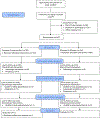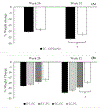Sympathomimetic increases resting energy expenditure following bariatric surgery: A randomized controlled clinical trial
- PMID: 35244344
- PMCID: PMC10167942
- DOI: 10.1002/oby.23384
Sympathomimetic increases resting energy expenditure following bariatric surgery: A randomized controlled clinical trial
Abstract
Objective: The aim of this study was to test the hypothesis that ephedrine + caffeine (EC) reduces the fall in resting energy expenditure (REE) following bariatric surgery.
Methods: This 32-week, randomized, double-blinded, placebo-controlled trial included 142 patients who underwent Roux-en-Y gastric bypass (RYGB) or sleeve gastrectomy (SG) surgery. Participants were randomized to either EC or placebo for 27 weeks, beginning 5 weeks post surgery. The primary end points were change in REE (measured), percentage of predicted REE ([measured REE/Harris-Benedict equation-predicted REE] × 100), and body composition. Secondary outcomes included change in percentage of weight. Adverse events (AEs) were recorded.
Results: The reduction in REE was smaller in the EC versus the placebo group, but it was not significant. Percentage of predicted REE was increased in the EC versus the placebo group (difference, mean [SE]: 5.82 [2.29], p = 0.013). Percentage of weight (difference: -3.83 [1.39], p = 0.007) was reduced in the EC versus the placebo group. Percentage of predicted REE was increased and body weight decreased in the EC-treated participants who underwent SG compared with those who underwent SG and were treated with placebo (difference in percentage of predicted REE = 8.06 [2.83], p = 0.006; difference in weight percentage = -4.37 [1.92], p = 0.025). Percentage of fat-free mass was increased in the SG participants treated with EC versus placebo (difference: 1.31 [0.63], p = 0.042). The most common AEs were anxiety, dizziness, insomnia, and tremors. Most AEs were not different from placebo by Week 32.
Conclusions: EC enhances weight loss and reduces the fall in REE following bariatric surgery. Adrenergic symptoms mostly resolve over time.
© 2022 The Obesity Society.
Conflict of interest statement
Figures


References
-
- Arterburn DE, Telem DA, Kushner RF, Courcoulas AP. Benefits and Risks of Bariatric Surgery in Adults: A Review. JAMA 2020;324: 879–887. - PubMed
-
- Leibel RL, Hirsch J. Diminished energy requirements in reduced-obese patients. Metabolism 1984;33: 164–170. - PubMed
-
- Yoshino M, Kayser BD, Klein S. Effect of Diet versus Gastric Bypass on Metabolic Function in Diabetes. Reply. N Engl J Med 2020;383: 2393–2394. - PubMed
-
- Leibel RL, Rosenbaum M, Hirsch J. Changes in energy expenditure resulting from altered body weight. N Engl J Med 1995;332: 621–628. - PubMed
Publication types
MeSH terms
Substances
Grants and funding
LinkOut - more resources
Full Text Sources
Medical
Research Materials

